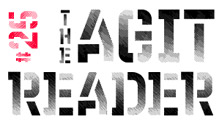
Fireside Books
Since its inception 15 years ago, Pitchfork has risen to become not only the site for music criticism on the web, but has usurped aging print publications like Rolling Stone and SPIN to become the source for popular music commentary on or off the internet. Now, they’ve entered the book publishing realm with The Pitchfork 500, their guide to the greatest songs of the past 30 years.
Starting with the premise that 1977 was the year in which the template for the modern music of today was set, the book attempts to trace song-by-song the evolution from that year’s punk, disco and electro-, kraut-, industrial-whatever explosion to the music being download by today’s discerning ears. And one could easily argue that Pitchfork’s editors and writers have done exactly that, in the process touching on every seismic shift, sonic permutation and important artist of the past three decades.
And one could just as easily nitpick at the choices made for the book. Half the fun of reading Pitchfork is disagreeing with their (at times) polarizing opinions. The other half may be the site’s notoriously snarky attitude. But here, the writers divorce themselves from such quips, presumably since in covering some of the best songs ever recorded, they are actually writing about music they love, rather than just merely reviewing the latest Mates of State album.
As such, Pitchfork editor Ryan Schreiber and his roster of writers wax eloquently on artists as far flung as Throbbing Gristle, Felt and Aphex Twin, making a case for each of their varied works. In many ways, the book accomplishes a much more massive task than merely the top 500 albums from the same time period, which would likely be more predictable and skip over many of the artists gathered here, who never got their full 15 minutes, or rather 45 minutes, and were only captured on wax for a couple of sides.
The only thing that seems problematic is when the book seemingly breaks from the punk ethos of its premise to cover such bloated, dinosaurian acts as ELO, Journey and Steely Dan. But again, it’s a minor quibble in what’s an otherwise thorough and enjoyable read.
Stephen Slaybaugh
Happy Mondays: Call the Cops
Lou Reed's Berlin
The Elephant Six Holiday Surprise Tour in Columbus
Jandek at the Wexner Center
Live reviews of My Morning Jacket and Echo and the Bunnymen
Radio Silence/A Selected Visual History of American Hardcore Music
Columbus Discount Records vs. Sub Pop
Skins & Punks
Kraftwerk and the Electronic Revolution
Agent Orange Live Review
Alice Cooper Live Review
The Shoegaze Top 10
Digital Downloads Round-Up
Live Reviews of Radiohead and Bon Iver
